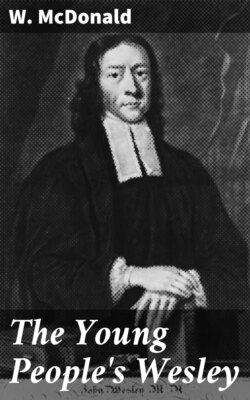Читать книгу The Young People's Wesley - W. McDonald - Страница 4
На сайте Литреса книга снята с продажи.
INTRODUCTION.
ОглавлениеTable of Contents
What, another Life of John Wesley! Why not? This time a "Young People's Wesley." If ever the common people had an interest in any man, living or dead, that man is John Wesley. It is true that we already have many "Lives" of this remarkable man. They range from the massive volumes of Tyerman down to the booklet of a few pages. The truth abides that of making many books there is no end, and so more Lives of Wesley will be written from time to time as the years and centuries come and go. The reason of this is that John Wesley is one of the greatest men of all the Christian centuries. When we undertake to enumerate the five greatest men that the English race has ever produced we must of necessity include the name of John Wesley. As the distance increases between the present time and the days of his protracted activity the grander does he appear. The majority of the men of his day and generation did not comprehend him. They could not, for the plan of his aspirations and achievements was far above their thinking or living. They did not realize his greatness; they did not foresee the influence he was destined to exert on all future generations. He has been dead more than a hundred years, and yet to-day he is larger, vaster, and more powerful in the wide realm of intellectual and spiritual activities than he was at any time during his long and vigorous life. So far as we can judge, this development of the stature of this wonderful man will continue for ages.
Remember that John Wesley was well bred. On both his father's and mother's side he inherited the qualities of the best blood of England. So far as we know, his ancestry was purely Saxon, and of the best type of English-Saxon lineage. On sea or land, in military affairs, as a diplomat or statesman, he would have been eminent. He was one of the most thorough and comprehensive scholars of his century. He was fully abreast of his times in all matters of natural science; he was a linguist of rare excellency; he was a metaphysician; he was at home in philosophy. He had the rare ability of using all he knew for the best and highest purposes. He was a real genius, not a crank. A genius utilizes environment; a genius dominates circumstances; a genius makes old things new; a genius pioneers mankind in its career of progress. Because of these qualities and characteristics, men will never tire of reading the life, and men will never stop writing the life, of this man. Born in the humble rectory of Epworth, in the midst of the fens of Lincolnshire, his name and fame reach to the ends of the earth. Men know him not for what he might have been, but for what he was—a friend of all, and a prophet of God.
Just now when the common people are more and more educated, and nearly all of them are readers of books, and many of them interested in good books, it is important that we have a Life of Wesley that is perfectly adapted to those who are not critical historical students, but rather to those who want the gist of things, who want the substantial and essential facts in compressed shape.
It is believed that this volume will meet all these requirements, and that a careful perusal of its pages will put any person of ordinary intelligence in very close touch with one of the greatest religious and social reformers the world has ever known. This volume is one that might be read with great profit by every member of our Church, and by all Methodists everywhere. Especially would its reading help all our young people, and particularly the members of our Epworth League. It is certain that its reading would give them clear, definite, and correct views of the life and work of the founder of Methodism; and such views would be sure to lead to a more healthful and vigorous personal religious experience, and would encourage all heroic aspirations for the highest attainments in holy living, and excite the most ardent and persistent efforts for the salvation of all men. John Wesley knew that humanity had been redeemed by the sufferings and death of the Lord Jesus Christ. He knew that every redeemed soul might be saved. He knew that it was his business to bring redeemed humanity to the feet of its Redeemer. Would that all his followers might share in this threefold knowledge; and that by the reading of this volume all might be led to consecrate themselves to the accomplishment of the supremely glorious task at which John Wesley wrought until he ceased at once to work and live. O, that all Methodists might follow John Wesley even as he followed Christ!
W. F. Mallalieu.
Auburndale, Mass., April 8, 1901.
